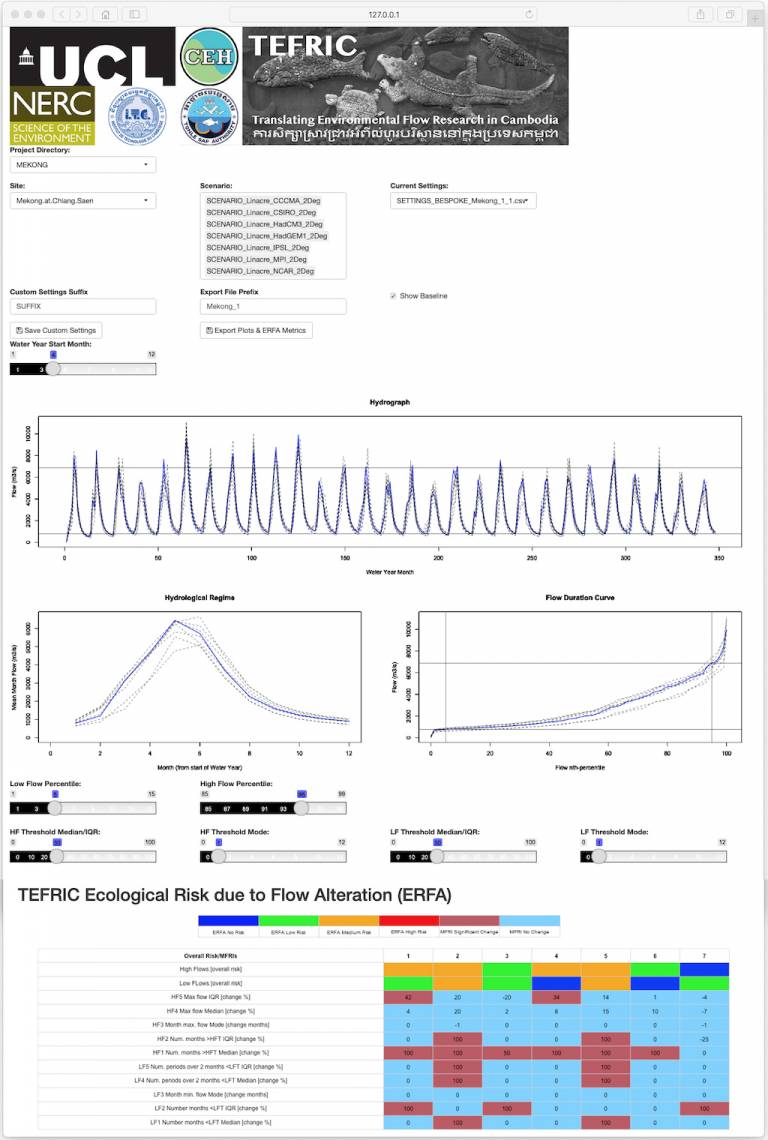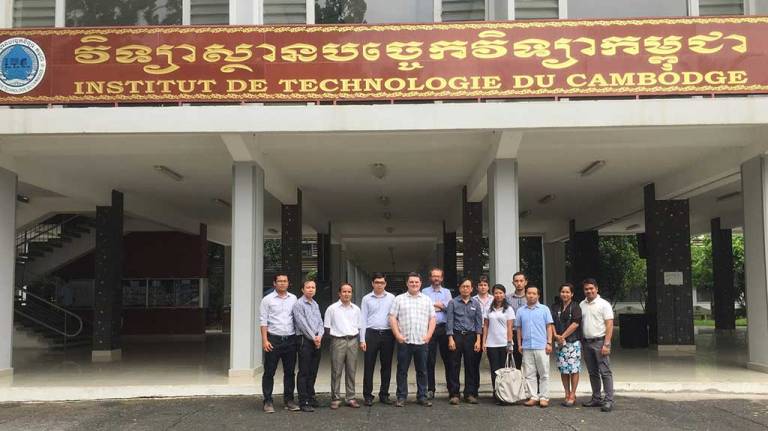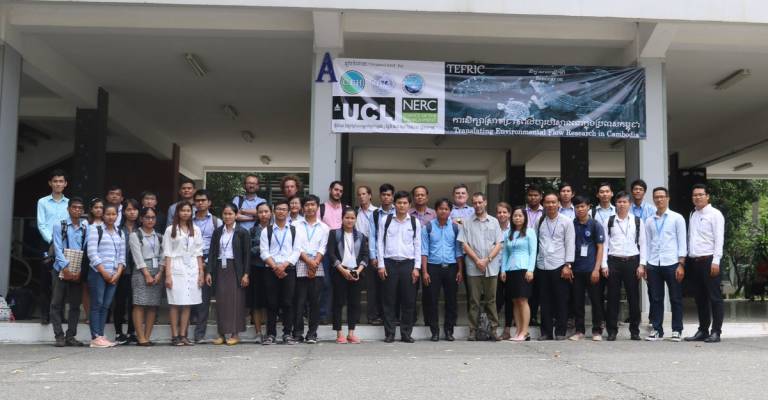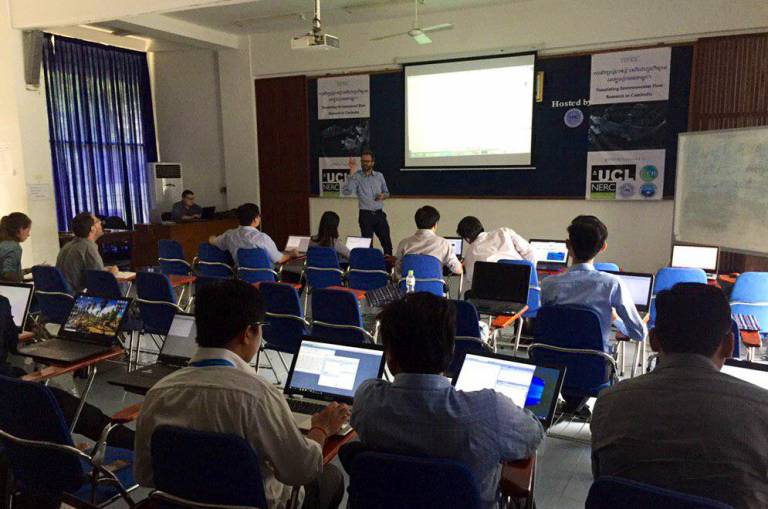The TEFRIC project introduced the concept of environmental flows to Cambodian water resources management and environmental research.
TEFRIC was a collaborative project led by UCL Geography (Professor Julian Thompson), the UK Centre for Ecology and Hydrology (Dr Cedric Laize), the Institute of Technology of Cambodia (ITC, Drs Sarann Ly and Ratino Sith) and Cambodia’s Tonle Sap Authority. It was funded by the UK Natural Environment Research Council (NERC) Innovation Follow-on programme.
- About the Project
The project was designed to introduce the concept of environmental flows to Cambodian water resources management and environmental research as well as to develop software tools that enable environmental flow assessments based on time series of baseline (current) and scenario (future / perturbed) river discharge.
The term “environmental flows” describes the flow regime of a river required to maintain economically, socially and ecologically important ecosystem services. In the Cambodian context, these include the central role of rivers in sustaining livelihoods through agriculture and fisheries. A river’s flow regime, comprising key components of variability, magnitude, frequency, duration, timing and rate of change, is central to sustaining biodiversity and ecosystem integrity. All elements of the flow regime are important for some aspects of river ecosystems so changes in the regime, due to factors that include climate change and water resources developments, can have ecological implications.
- TEFRIC ERFA Software
A central aim of TEFRIC was the development of a documented, user-friendly open-access version of the Ecological Risk due to Flow Alteration (ERFA) environmental flow code. This new code, TEFRIC ERFA, enables the rapid calculation of a series of metrics that characterise the magnitude of change from a baseline (historical) river regime for any number of scenarios. The risk of change in both high and low flow conditions can then be assessed based on the number of metrics that change beyond defined thresholds.
Originally applied in Europe (Laize et al., 2013) and subsequently employed in climate change impact assessments for the Mekong River system (Thompson et al., 2014), the original version of ERFA was an expert system programmed in R. As part of the TEFRIC project, this R code was refined and a user interface developed using shiny. TEFRIC ERFA was refined to include new metrics and additions to the user interface following an expert workshop held in Phnom Penh in July 2018 (see TEFRIC Workshops).

The TEFRIC ERFA user interface
The software was extensively tested, including within practical elements of the UCL Department of Geography's MSc teaching programme and using river flow datasets from around the world (Asia, East and Southern Africa, and North and South America).
- TEFRIC Workshop
Expert Workshop - Phnom Penh, July 2018
An initial version of TEFRIC ERFA was demonstrated to Cambodian experts in hydrology and aquatic ecology at a workshop held at ITC in July 2018 (see Thompson et al., 2018). Participants included representatives from Governmental environmental management agencies and ministries, universities and research institutes and international NGOs.

Participants in the TEFRIC environmental flows workshop, Institute of Technology of Cambodia, 18 July 2018
Using a series of climate change scenarios for the Mekong (including those reported by Thompson et al. 2013 and Robinson, 2018), refinements to TEFRIC ERFA were collaboratively identified by workshop participants. These included suggestions for additional flow regime metrics, the definition of appropriate thresholds for existing metrics and refinements to the user interface and output options to enhance the software's usability.
Environmental Flows Meeting and TEFRIC Launch - Phnom Penh, June 2019
The final version of TEFRIC ERFA was launched at a two-day meeting held in Phnom Penh in June 2019. Participants included environmental scientists (universities and research institutes) / practitioners (Government ministries) and consultants from Cambodia, Laos, Thailand and Vietnam as well as international NGOs. The meeting included lectures on the science of environmental flows and the theoretical background to the approach used within TEFRIC ERFA. The application of TEFRIC ERFA to climate change impact assessments for the Stung Sen river system (the largest tributary of the Tonle Sap) using hydrological modelling undertaken by ITC was demonstrated. Participants also received hands-on training in the use of TEFRC ERFA.

Participants in the final TEFRIC meeting, Institute of Technology of Cambodia, Phnom Penh, 27-28 June 2019

Hands-on training in the TEFRIC ERFA software during the final TEFRIC meeting (Institute of Technology of Cambodia, Phnom Penh, 27-28 June 2019)
- Download TEFRIC ERFA
The TEFRIC ERFA code is available from the UK Centre for Ecology and Hydrology Environmental Information Data Centre. It includes a comprehensive manual and example data sets. The software is made available under the terms of the General Public License as published by the Free Software Foundation, either version 3 of the License, or any later version. As such it is free to use although it should be cited as follows:
Laize, C.L.R. and Thompson, J.R. (2019). An implementation of the Ecological Risk due to Flow Alteration (ERFA) method. NERC Environmental Information Data Centre.
 Close
Close

